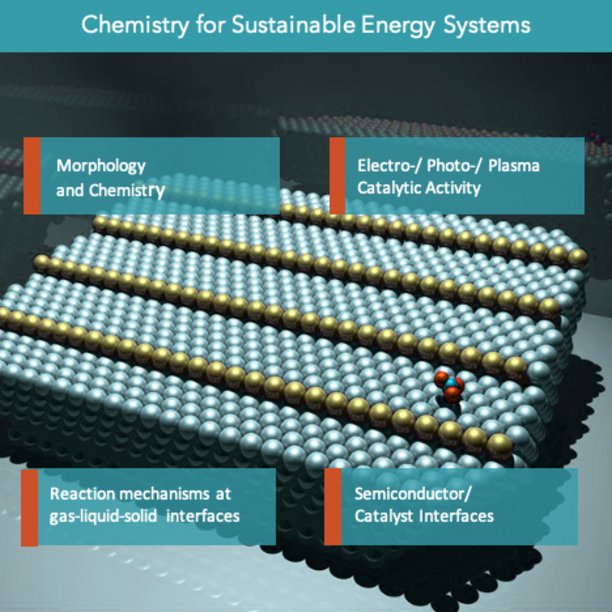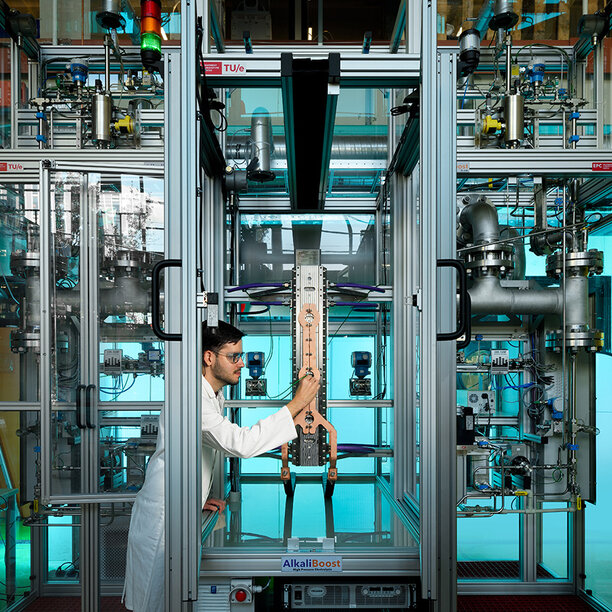Principal Scientists
Departments involved/ contributing to EIRES
- Applied Physics
- Chemical Engineering and Chemistry
- Mechanical Engineering
Research and application areas
- H2O electrolysis
- Photo-electrochemical conversion processes
- CO2 electrolysis
- Hydrocarbon oxidation routes
- Plasma-catalysis
- CO2 capture and storage technologies
Related Research Groups
We acknowledge the TU/e research groups which are already involved with EIRES, either through the TU/e Sector Plan positions and PhD projects. We welcome all research groups interested in collaborating and contributing to the research focus of EIRES.
Current and planned collaborations
Current projects and collaborations where Principal Investigators (PI) or Sector Plan positions are involved:
- DTU, ENGIE, Volkswagen and TU/e spin-off DENS through the EU funded project C2FUEL (industrial-scale conversion of CO2 captured from carbon-intensive industries to chemical fuels).
- TUD, RUG, WUR, Shell, Tata Steel, Nuon, Avebe, and Yara with the E2CB – TTW program 'Electrons to Chemical Bonds'.
- With several academic (UU, UvA, etc), industrial (AkzoNobel, Shell, BASF, etc) and governmental (ChemistryNL, NWO) partners through the Dutch national research centre (ARC-CBBC) that investigates chemical building blocks for novel sustainable energy and materials.
- Nouryon, DIFFER, local industry (e.g. VDL Group, ASML, TBRM, ...), TNO Voltachem and Province of Noord-Brabant with the iconic project of the Dutch Electrolyzer.
- TUD, UT, Avantium, TataSteel, Hydrogenics, Johnson Mattey, etc with an NWA project on power conversion for electrochemical storage RELEASE.
- DIFFER-TU/e Impuls PhD research programs with a focus on novel electro-catalysts for oxygen and hydrogen evolution reactions.
- DIFFER-Syngaschem B.V.-TU/e research program to unravel the fundamental principles behind high-value chemicals synthesis from green electricity, water and carbon dioxide, through an NWO (Chemical) Industrial Partnership Program (CH)IPP.
- Carbyon-DIFFER-TU/e research program on direct air CO2 capture with thin-film technologies through an Eindhoven Engine research project.
- Elestor and Nedstack, through the personal grant of Antoni Forner Cuenca (Veni-NWO) that focuses on the design and synthesize of novel electrodes with architected microstructures.
- Stoli Catalysts, with the PhD projects of Evgeny Rebrov in magnetically assisted electrocatalysis and fluidized bed plasma reactor design.
Researchers
We acknowledge the TU/e researchers which are already involved with EIRES, either through the TU/e Sector Plan positions and/or PhD projects. We welcome all researchers interested in collaborating and contributing to the research focus of EIRES.
Interesting reads
- Passion for plasma and people - Adriana Creatore wins NWO Athena award | December 3, 2021
- The electrolyzer enigma: how solving it could enable the energy transition | September 16, 2021
- An electrolyzer the size of a washing machine, to store local solar power in every home | March 10, 2021
- EIRES: Het instituut voor hernieuwbare energie dat ons dichter bij de oplossing brengt | January 11, 2021
- From nurse to engineer! | November 19, 2020
- The SCALE consortium | September 14, 2020
- XS grant for Antoni Forner Cuenca | August 25, 2020
- Eindhoven Engine gives green light to new innovation projects | July 9, 2020
- Light with Elham Fadaly and Adriana Creatore | June 30, 2020
Contact
EIRES | Focus Area: Chemistry for Sustainable Energy Systems
- Marta Costa Figueiredo - m.c.costa.figueiredo@tue.nl
- Adriana Creatore - m.creatore@tue.nl
- EIRES office - eires@tue.nl

